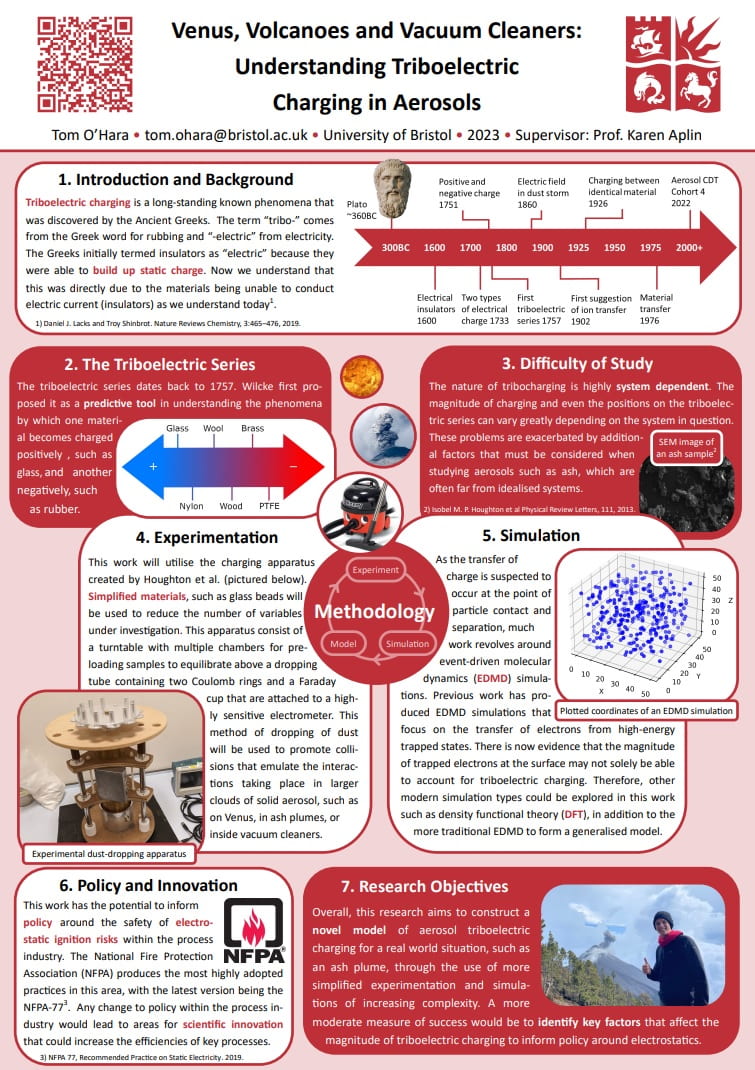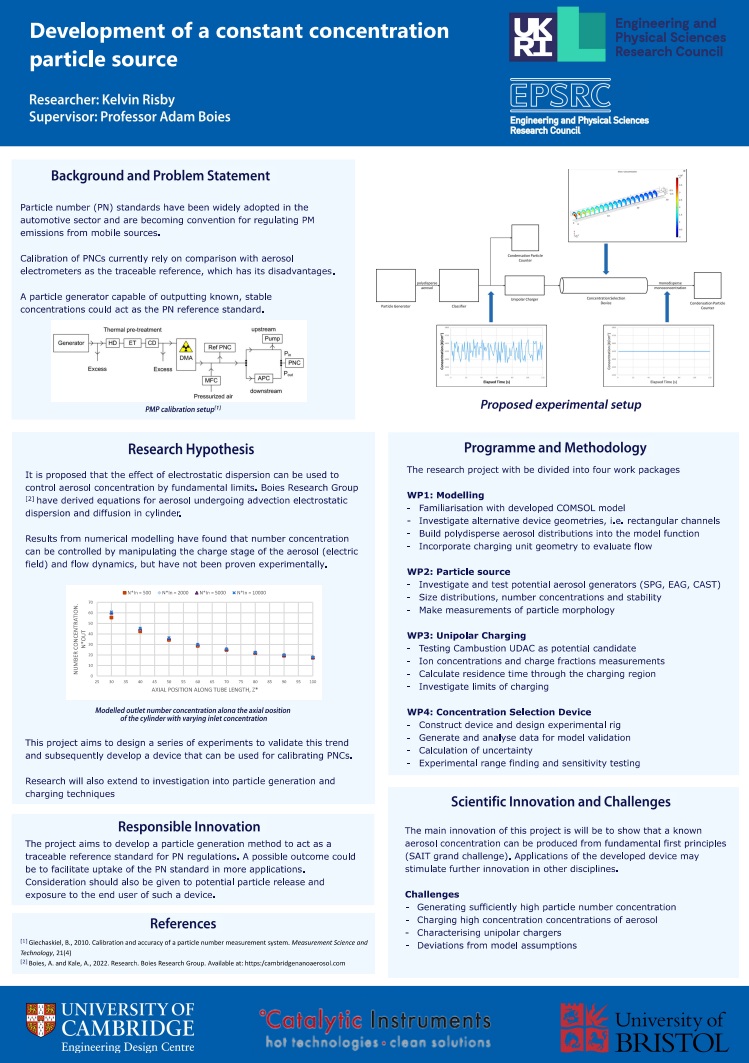Fundamentals
Advances are needed in our understanding the fundamental processes that control the physicochemical properties of aerosols, governing aerosol properties such as particle size distribution, composition and phase across a broad range of application areas. CDT projects are exploring approaches to tailor and control aerosol particle properties for desired applications, the charging of aerosol particles, the photochemical transformation of aerosol, particle crystallisation and resuspension, and particle coalescence. They are also developing new aerosol sources.
Particle-surface adhesive forces and their role in resuspension phenomena
Resuspension of particles from surfaces into air exposes people to hazardous dusts in a range of situations. This project will use atomic force microscopy to measure adhesive forces between particles and surfaces, and relate this to resuspension. Particles and surfaces with increasingly complex shape and surface properties will be prepared using techniques such as 3D printing and nanolithography, giving a systematic understanding of the influence of these factors. During placements with Dstl (sponsor), results will be used to validate and improve an existing mathematical model that predicts particle resuspension in a range of environments, thus enabling risks to be controlled.
PhD student: Henry Macpherson
Cohort: 6
Lead supervisor: Prof. Matthew Jones
Institution: University of Bath
This project is an industry funded studentship supported by DSTL
Improving our understanding of aerosol formation, transformation and lifetime in controlled atmospheres
Aerosols are a multiphase system composed of condensed particle and gaseous phases. How semivolatile organic compounds are distributed between the two phases governs key properties, such as the size distribution of particles and the chemical composition of the condensed phase. This has an impact on the transport of material in the environment and on its chemical aging. In this project, you will use models and single particle measurements to understand the partitioning of organic compounds, and work with partners DSTL to understand the consequences for trace detection of explosive species when sampling air for analysis.
PhD student: Ajay Potavadoo
Cohort: 6
Lead supervisor: Prof. Jonathan Reid
Institution: University of Bristol
This project is an industry funded studentship supported by DSTL
Model systems for exchange of liquid between different aerosol sources: application in disease risk during aerosol therapies
PhD student: Ryan Hyde
Cohort: 5
Lead supervisor: Dr Adam Squires and Dr Anton Souslov
Institution: University of Bath
Particle-surface adhesive forces and their role in resuspension phenomena
The resuspension of particles from surfaces into the air exposes people to hazardous dusts in a range of situations. This project will use atomic force microscopy to measure the adhesion force between particles and surfaces, and relate this to resuspension. Particles and surfaces with increasingly complex shape and surface properties will be prepared using techniques such as 3D printing and nanolithography, giving a systematic understanding of the influence of these factors. Results will be used to validate and improve an existing mathematical model that predicts particle resuspension in a range of environments, thus enabling risks to be controlled.
PhD student: Patric Boardman
Cohort: 5
Lead supervisor: Dr Matthew Jones
Institution: University of Bath
This project is an industry funded studentship supported by DSTL
Data-informed modelling of aerosol resuspension under aerodynamic loads
Resuspension of particles into the air is a complex phenomenon dependent on the interaction between particle morphology (e.g. size, shape), surface characteristics (e.g. roughness, hydrophilicity) and air flow (e.g. velocity, turbulence). The process can be hazardous to health, thus has received considerable research interest. Mechanistic models have been developed describing resuspension indicating adhesive forces are important but experimental and numerical sensitivity analysis exploring ranges is scarce to validate these resuspension models. The research project will explore how adhesive interactions alter the forces required to separate particles from a surface using a combined experimental and numerical approach. By using state-of-the-art measurement and numerical techniques, the project aims to provide a comprehensive description towards the parameters influencing the resuspension process.
PhD student: Nicolas Duthou
Cohort: 5
Lead supervisor: Dr Alberto Gambaruto, Prof Karen Aplin
Institution: University of Bristol
Responsive Aerosol: A Design Framework for Aerosol with Required Properties
The broad objective of the PhD is to develop a framework for assessing the extent to which the responsive properties of aerosols can be designed and stimulated by changes in their environment. We will examine the potential of aerosols formed from gels and amorphous phases to provide dynamic response to environmental stimuli.
PhD student: Sorrel Haughton
Cohort: 4
Lead supervisors: Prof Jonathan Reid & Prof Wuge Briscoe
Institution: University of Bristol
Time-Resolved Photochemistry of Organic Solutes in Aqueous Microdroplets
The photochemistry of atmospheric aerosols is crucial to assessing their climate and health impacts. However, the reaction dynamics of photochemical reactions may differ in aerosol compared to in macroscopic solutions. This project will develop a brand-new approach to study chemical reaction dynamics on ultrafast timescales in individual levitated droplets.
PhD student: Conlan Broderick
Cohort: 4
Lead supervisor: Dr Bryan Bzdek
Institution: University of Bristol
Venus, volcanoes and vacuum cleaners: understanding triboelectric aerosol charging
Electrostatic charge is generated through frictional (“triboelectric”) interactions between aerosol particles. This charging causes lightning in dust and volcanoes on Earth and in space, and hazards in industrial processing of powders and granular mixtures. The student will apply both theoretical and experimental techniques to investigate and understand the mechanisms involved.
PhD student: Thomas O’Hara
Cohort: 4
Lead supervisor: Dr Karen Aplin
Institution: University of Bristol
Mechanics of soft aerosols
Many biological and synthetic aerosols are composed of soft materials that behave somewhere between fluids and solids, including viscous droplets of mucus proteins and lipids that transmit COVID19. In this project, you will explore the soft-matter science behind aerosol suspensions by modelling how surface tension and viscoelasticity affect droplet production and adhesion. The outcomes could be relevant to the science of masks and droplet spreading.
PhD student: Jamie Mclauchlan
Cohort: 3
Lead supervisor: Dr Anton Souslov
Institution: University of Bath
Development of a constant concentration particle source
Worldwide, methods of measuring particles require calibration, yet none exist. This project develops a commercial device to produce a known concentration of particles by controlling the charge state and fluid dynamics. The work will harness results from recent modelling to develop and test the first aerosol “concentration controlled” prototype.
Cohort: 3
Lead supervisor: Dr Adam Boies
Institution: University of Cambridge
This project is an industry funded studentship supported by Catalytic Instruments.
![]()
Crystallisation in nano-droplets
In this project you will develop cutting-edge instrumentation to produce and study sub-nanolitre droplets as they evolve in a controlled vapour environment, observing crystallisation and phase changes in real time using imaging and x-ray scattering. With this instrumentation you will study the fundamental science underpinning atmospheric, industrial and pharmaceutical processes.
PhD student: Jack Macklin
Cohort: 2
Supervisor: Dr Adam Squires
Institution: University of Bath
High-confidence modelling of particle resuspension
The resuspension of particles deposited on surfaces is a crucially important generation mechanism for biological, environmental and hazardous aerosol particles. Using cutting edge experiments and models, the nature of the particle-surface interaction (e.g. particle shape, surface roughness) will be explored and the resuspension mechanism directly probed by high frame rate imaging.
PhD student: Edward Neal
Cohort: 2
Lead supervisor: Prof Jonathan Reid
Institution: University of Bristol
This project is an industry funded studentship supported by DSTL.

The Coalescence of Drying Droplets
The initial experiment proposed here will focus on the collisions of water–water droplets of ~ 30–80 μm radius. This novel size makes the proposed work relevant to the research of aerosols and their microphysical properties. A comparison can be made with existing collisional regime maps of water to determine whether droplet size, and the shift in the kinetic regime, influencesthe collisional outcome. This will be investigated using two microdroplet dispensersto collide droplets, imaged by a stroboscopic imaging technique. Following this, the effect of viscosity on the regime map can be determined using the same method, with varying concentrations of aqueous sucrose droplets.
PhD student: Lauren McCarthy
Cohort: 1
Supervisors: Prof Jonathan Reid (Bristol) and Dr Rachael Miles (Bristol)
Institution: University of Bristol

EPSRC CDT in Aerosol Science
University of Bristol
School of Chemistry
Cantock’s Close
Bristol, BS8 1TS
aerosol-science@bristol.ac.uk
Partner Newsletter
Sign up to receive monthly news and updates from the CDT in Aerosol Science, as well as events, training and research webinars.







